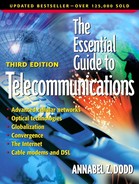Conclusion
It appears that technology for making the Web fast and building infrastructure to keep up with large amounts of traffic is more advanced than business models for earning profits on the Internet. Internet service providers, online retailers and portal operators, among others, are struggling to build new infrastructure, attract customers and capital and eventually make a profit.
One unknown about the acceptance of the Internet as a medium for entertainment and consumer commerce is the rate at which populations adopt high-speed Internet access. It's also unclear if consumers see the Internet as just an extension of using a computer at work and want to watch television to relax in their off-hours rather than browse the Internet. As youngsters that take for granted using computers for chats and games grow up, this attitude may change. In addition to high-speed access, consumers often do not have browsers with the capability to receive some types of streaming video and audio. Nor do they always have the ability or know how to download Adobe Reader to take advantage of documents presented as portable document format (PDF) files.
Interestingly, South Korea has the highest percentage of people with broadband access to the Internet. They access streaming video and audio more than any other country, which makes them more likely to use the Internet for entertainment. Two important factors led to South Korea's high rate of high-speed access. Most of their population lives in densely populated cities. Laying new fiber optic lines in these areas results in faster financial returns than in rural areas. In dense cities, more potential customers create larger revenue streams per strand of fiber. In addition, the South Korean government licensed only a limited number of facilities-based carriers. Thus, investments and profits are concentrated among fewer companies with the necessary capital to invest in infrastructure.
Regardless of the speed of consumer acceptance of the Internet, it's clear that the Internet has had an enormous impact on business. In particular, global transactions take place at a faster pace than ever before. Companies send each other email and attachments regardless of time zones. Moreover, corporate Web sites are important public relations and marketing vehicles. Potential customers and suppliers “check out” each other's Web sites often prior to making initial contacts. Press conferences, consultant briefings and corporate financial reports all can be presented through a variety of means including streaming audio presentations and audio conferences combined with online presentations.
